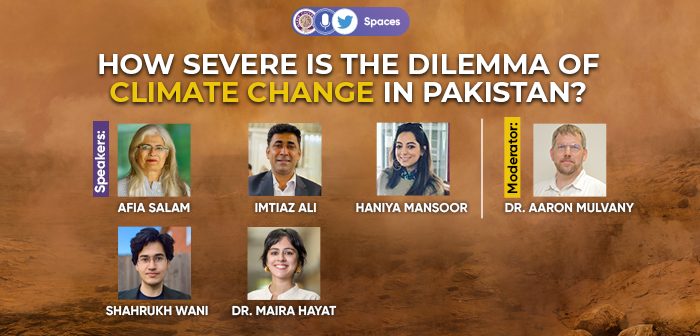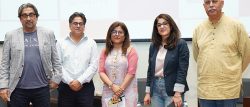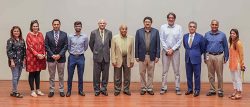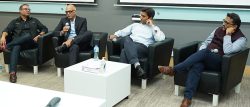“Climate Change is all about Climate Justice and Class Injustice,” says Afia Salam, the renowned Environmentalist and Media Development Specialist, while speaking on Habib University’s platform for Twitter-active audience on the sideline of ‘The Dilemma of Climate Change.’ Salam going further in-depth of it, asserted that it surely sounds like more like the world of haves and haves-not!
Last evening, Habib University took the initiative to host a panel of experts on the online forum through Twitter Space, on ‘The Dilemma of Climate Change’ with the hope that the realization will come thru for others in the wake of the catastrophe that this needs to be discussed as an insightful enterprising opportunity to understand what the poor villager faced when the roaring floods took away not only his farm-land but also his life! The vulnerable human life!
Certainly, to understand what exactly led the flooding happen in Pakistan, where one-third of the country has been gravely suffered, most notably in the rural areas, according to Maira Hayat, Assistant Professor of Environment and Peace, at the University of Notre Dame, who claimed that, “There are no immediate factors what could have been done. The World Bank released its Report in 2004, on this issue of flooding. Big question remained that we should find no excuse on what could have been done? However, when it happens the constraints grew. We need to show how not to pause it. Damage can be averted and the inquiry can begin. Climate Change is considered something out of the blue—it is an urgent issue, and its not separate factor behind the Rural and Urban relationship.”
Come to think of it, the major issue pertains to the humanitarian cause. According to Imtiaz Ali, Lecturer of Environment and International Relations, University of Karachi, who shared Dadu-centric story, “What is the humanitarian cause in Dadu, where the women and children were major sufferers. Unfortunately, this is a big issue in Sindh. About 12 deaths took place in Dadu and Larkana today.” Ali believed that there are 3-major underlining causes of the flooding, majorly “The first cause was the Environmental Changes and the role of Mis-management with centuries old-Agrarian System which relies on the outdated Agriculture System. Secondly, Divergence of Water and finally, Deforestation which took place in Shikarpur, Larkana and Dadu. It is here one finds the influential political families (their role in it). Floods across Sindh, have seen change of force. There is politics behind it. They are trying to maximize from it.”
In giving her insight to the recent flooding impact Ms. Salam said that the river-zoning is required otherwise as we witnessed, “the hotel collapsed like a straw. Which is unfortunate?” She further said that, in 2010, “Actual allocation of funds were given for this purpose (to government offices). But there is no pressure and they are not regular things which got crafted. The Civil Society was the first one to respond and put their efforts in there. Things are not good, because the initial response was not there.”
Haniya Mansoor, Founder of Project Kamyabi, shared her thoughts on the Climate Change asserting that she first heard about the word, ‘Climate Change’ as a 12-year-old girl-child. She viewed the factor which required major Social Policy Changes when talking in terms of Textiles industry, Punjab province and better governance issue.
Ms. Hayat kept the fact upright, that, “The habit of governing is so down. Nothing has really happened. Internal Accountability hasn’t happened, which is utterly lacking.”
About 90 minutes into the Twitter space, the Habib University’s faculty member, who was the Moderator to this event, Mr. Aaron Mulvany, Program Director, Social Development and Policy about his own experience, “Such collective misery, I have never seen in my life, what I saw in Badin. Its true when they say in Sindh and Baluchistan painted a Doomsday (landscape). Which is an unfortunate time.”
Listen to complete episode here:
— Habib University (@HabibUniversity) September 20, 2022
The next episode of this online forum, will be open in the due course of time. Kindly watch out for it, on the HU website and Habib University’s Twitter handle for further details.




